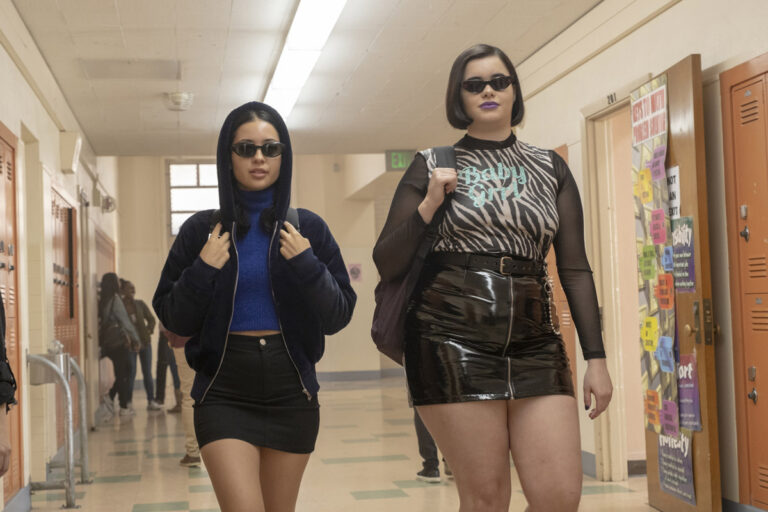Diagnosing the ‘Euphoria’ fever: Why do we fetishise the high school experience?
OMG, are you caught up with Euphoria? I’m willing to bet my knock-off Prada that’s not the first time you’ve been asked this question in the last few days. Back for a second season, HBO’s teen drama is saturating our timelines faster than you can say Omicron and has cemented itself as the latest must-watch TV show.
If you’ve seen it then perhaps you’ll understand why it is such a success. Euphoria’s vibrant characters, exhilarating storylines and intoxicatingly sexy aesthetic make the perfect recipe for a hit show among gen Z. But there’s a more complex reason why we love it so much, beyond the obvious production value.
View this post on Instagram
Euphoria belongs to that trite yet inevitably addictive canon of the ‘High School drama’. From Grease to Glee, for decades we haven’t been able to get enough of the stuff. But have you ever stopped to wonder why the lives of students are so fascinating to us?
I’d argue it’s a matter of fantasy. Shows like Euphoria give us an embellished reflection of our high school years, showing us teenage life with adult freedoms.
This is plain to see in the recent ‘And why aren’t you in uniform?’ trend on TikTok. These videos see users dressed in casual hoodies and jeans, only to ‘remember they go to Euphoria High’ and reappear in a sexy I.AM.GIA two-piece and stripper pleasers. These exaggerated impersonations of the show’s fiercely iconic Maddy Perez (played by Alexa Demie) affectionately mock the notion of being allowed to wear the outfits to school that the Euphoria characters don so casually.
@kenzocole almost forgot 😖 #euphoria #highschool #rue
♬ And why arent you in uniform - UGKDylan
@kerrionpiphus maddy is the IT gurl #euphoria #euphoriaseason2 #rue #fyp
♬ And why arent you in uniform - UGKDylan
View this post on Instagram
Don’t get me wrong, Euphoria’s audience acknowledges that the characters’ lifestyles are unrealistic—but that’s exactly the appeal. Maddy, Jules and Cassie are playing out our fantasies of looking our absolute best at a time in our lives when our self-consciousness is at its most crippling. Don’t even get me started on my girl Rue…
Alongside fashion, characters in our beloved high school dramas are shown to be as romantically preoccupied as some of us dreamt we were back in those hormone-charged years. Burgeoning sexuality has been a core theme of teen dramas since the 60s, with the likes of Rebel Without a Cause and, again, Grease celebrating the rise of youth culture and the rejection of pre-war sexual conservatism.
Angsty teenage years are defined by the desire to enjoy these mature freedoms. As was the case with Glee, Euphoria shows us teen characters performed by actors several years older and gorgeous. They wield the power we strived to possess in our teen years and we can’t help but admire them for it. The contrast of their cultivated style and allure with the green high school environment gives us the fantasy we unknowingly craved all along.
While Euphoria and similar shows are pedallers of dazzling fantasy, they are also vehicles of that oh-so-needed catharsis. At first, we might label the high school drama appeal as merely nostalgia; a rose-tinted reminiscence of the ‘best times of our lives’. But those formative years are often when we experience traumas that we carry with us for the rest of our lives.
As we shed the skin of prepubescence, the skin of adolescence beneath is raw and scar-prone. Watching these traumas happen to someone else in dramas creates enough distance to make the experience cathartic and almost purging. This is where fantasy comes into play.
Exaggeration and embellishment in these productions act as a cushion against the harsh truths we are revisiting. Watching Quinn Fabray get kicked out by her parents for getting pregnant in Glee is made somewhat easier when you’re singing along to Avril Lavigne’s ‘Keep Holding On’ minutes later.
Trivial problems feel like the end of the world when you’re a teenager, so serious problems are truly earth-shattering. Watching characters experience these emotions on-screen, among the glamour, validates the impact events had on us at the time. They also remind us that we still experience these same traumas in our adult lives, and although the sting of adolescence may be dimmed, we still relate to them all the same.
Take the most recent episode of Euphoria (season two, episode two), for example, where we see Kat struggling with self-loathing and body dysmorphia. Sadly, toxic body standards are a common issue, especially for cis-women, trans-women and genderqueer people at that age. Audiences relate to the memory of such feelings, but also because they are still dealing with similar events in their current age. The same goes for the depictions of abusive relationships, depression and drug addiction.
While for many of us our teen years were more popping oxytetracycline than OxyContin, addiction is a worrying possibility for us all, if not a reality. Teen dramas reflect our lives, past and present; they depict both the worrying realities and the dreaded possibilities.
Euphoria shows us who we wish we were at high school, and perhaps who we still wish we were now. Gloriously gritty and sexy fantasy is an addictive escapism, so it’s no wonder we tune in to the show each week. And why shouldn’t we? Teenage dreams dwell as long as teenage traumas.





